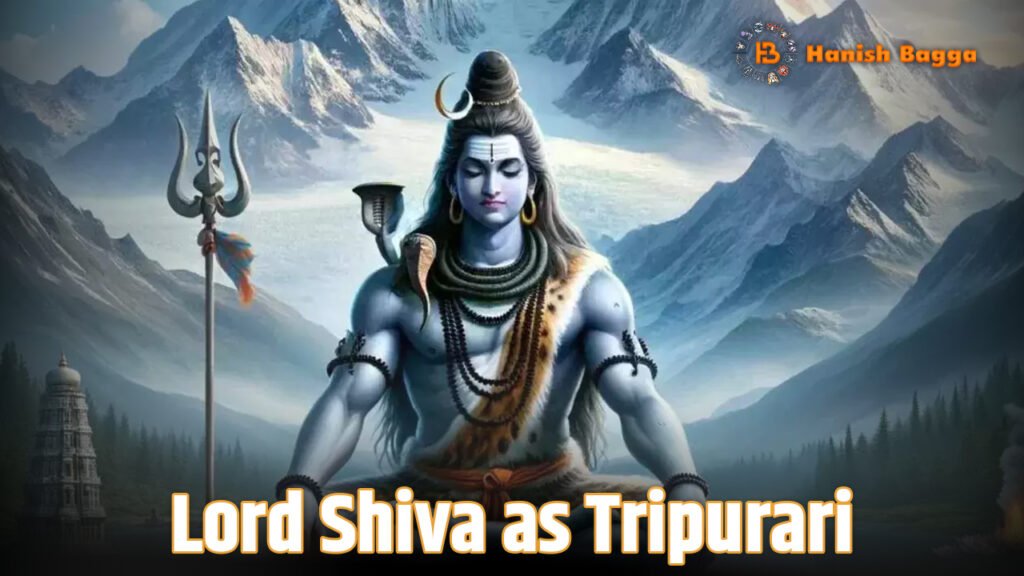Lord Shiva as Tripurari
In the opulent tapestry of Hindu mythology, Lord Shiva stands as a figure of unparalleled magnificence. Among his many illustrious titles, “Tripurari” holds a place of particular distinction. This blog post delves into the rich narrative behind this epithet, exploring its origins and significance in the grand pantheon of Hindu deities.
The Legend of Tripura
The tale of Tripura is one of celestial grandeur and divine intervention. In ancient times, there existed three floating cities of gold, silver, and iron, collectively known as Tripura. These cities, crafted by the celestial architect Maya, were a testament to otherworldly splendor and technological marvel.
The Asuras of Tripura
The Asuras, or demons, who inhabited these cities, were blessed with immense power and near-immortality. Their strength and prosperity grew to such an extent that they began to pose a threat to the cosmic balance. The gods, concerned by this growing menace, sought the intervention of Lord Shiva.
The Divine Challenge
The destruction of Tripura presented a unique challenge. The cities could only be destroyed when they aligned perfectly, an event that occurred only once in a thousand years. This rare cosmic alignment required precision and power beyond mortal comprehension.
Lord Shiva’s Intervention
In a display of divine prowess, Lord Shiva took up the mantle of cosmic protector. His preparation for this monumental task was a sight to behold, involving the most exquisite elements of the universe.
The Celestial Bow and Arrow
Shiva’s weapon of choice was no ordinary armament. The bow was crafted from Mount Meru, the cosmic axis of Hindu cosmology. The bowstring was formed from the great serpent Vasuki, known for its role in the churning of the cosmic ocean.
The Moment of Destruction
When the three cities aligned, Lord Shiva released his arrow with unerring accuracy. In a single, magnificent shot, he pierced all three cities, reducing them to ashes. This act of cosmic significance earned him the title “Tripurari” – the destroyer of Tripura.
The Significance of Tripurari
The title Tripurari goes beyond mere mythology. It embodies profound philosophical and spiritual concepts central to Hindu thought.
Symbol of Spiritual Victory
In the esoteric interpretation, the three cities represent the three states of consciousness – waking, dreaming, and deep sleep. Shiva’s destruction of these cities symbolizes the transcendence of these states to achieve ultimate spiritual realization.
Destroyer of Ignorance
The three cities can also be seen as metaphors for the three impurities of the soul – ego, karma, and maya (illusion). Shiva, as Tripurari, represents the force that destroys these impurities, leading to spiritual enlightenment.
The Continuing Legacy
The legend of Tripurari continues to inspire and awe devotees of Lord Shiva. It is celebrated in various forms across India, from grand temple rituals to intimate personal devotions.
Artistic Representations
The image of Tripurari has inspired countless works of art. Sculptures and paintings depicting this legend adorn some of the most magnificent temples across India, serving as a testament to the enduring power of this narrative.
Modern Interpretations
In contemporary spirituality, the concept of Tripurari is often invoked as a symbol of overcoming personal obstacles. It serves as a powerful metaphor for conquering one’s inner demons and achieving personal growth.
Conclusion to Lord Shiva as Tripurari:
The title Tripurari encapsulates the multifaceted nature of Lord Shiva – destroyer, protector, and liberator. It stands as a reminder of the cosmic drama that unfolds in Hindu mythology, and the profound spiritual truths it embodies.
For interesting astrology related videos, subscribe us on Youtube
FAQs about Lord Shiva as Tripurari:
Q1. What does the name Tripurari mean?
Ans- Tripurari literally translates to “the enemy of Tripura,” signifying Shiva’s role in destroying the three cities.
Q2. Are there other gods associated with the Tripura legend?
Ans- While Lord Shiva is the primary deity, other gods like Vishnu and Brahma play supporting roles in some versions of the story.
Q3. How is the Tripurari aspect of Shiva worshiped today?
Ans- Many Shiva temples have special rituals dedicated to Tripurari, especially during festivals like Maha Shivaratri.
Q4. What lessons can we draw from the Tripurari legend?
Ans- The story teaches about the triumph of good over evil, the importance of divine timing, and the power of focused intention.
Q5. Are there any specific mantras associated with Tripurari?
Ans- Yes, there are several mantras dedicated to Tripurari, often chanted for overcoming obstacles and spiritual purification.

